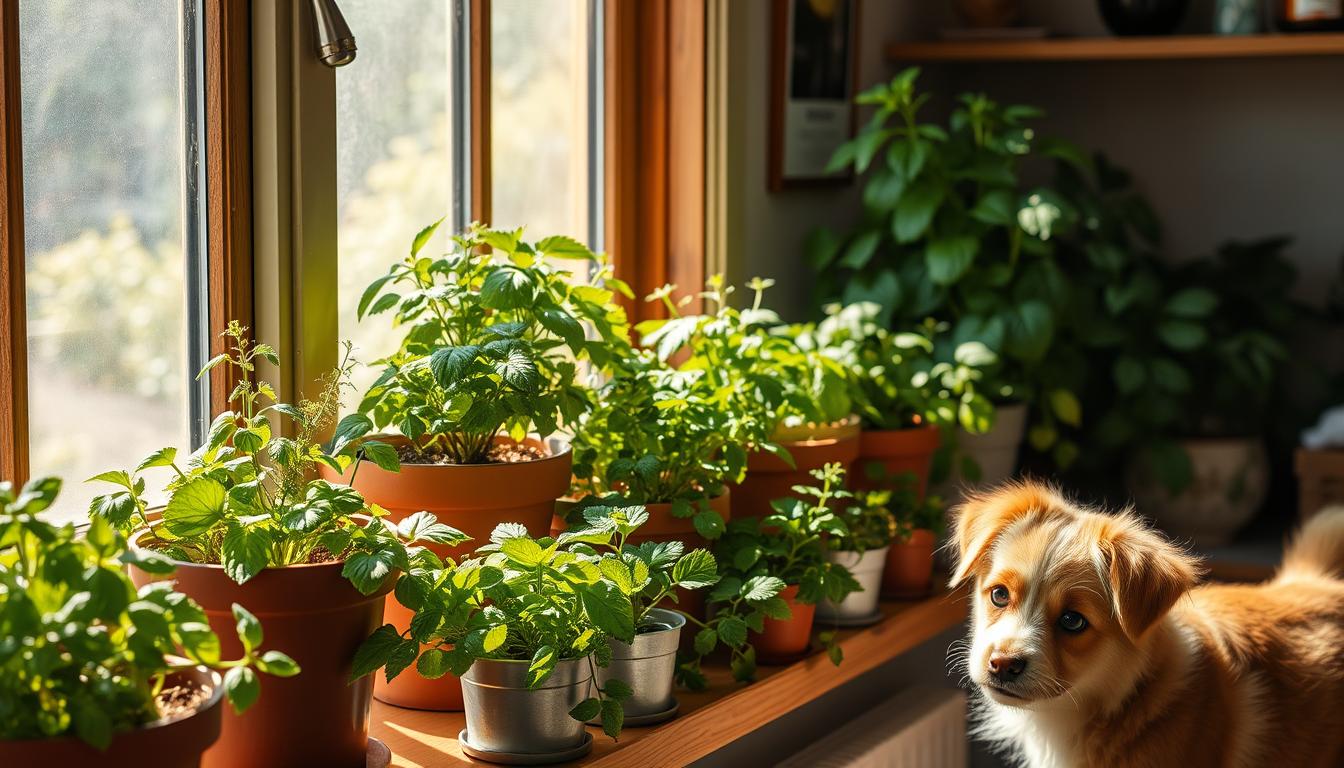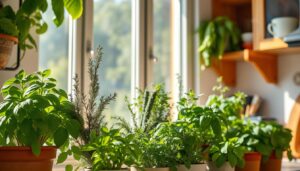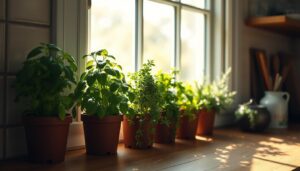Did you know that over 68% of American households have at least one pet? Our furry friends bring us a lot of joy. But, we must think about the plants we bring into our homes to keep them safe. Luckily, there are 18 non-toxic herbs that can grow indoors without harming your pets.
Key Takeaways
- Discover 18 pet-friendly herbs for your indoor garden
- Learn why choosing non-toxic plants is essential for pet owners
- Explore the benefits of growing herb gardens that are safe for your furry companions
- Gain tips on caring for indoor herb gardens with pets in mind
- Understand which common herbs to avoid and how to encourage safe interactions
Cultivating a Pet-Friendly Herb Garden Indoors
Indoor gardening with pets means picking non-toxic herbs is key for their safety. Many plants at home can harm pets if eaten, leading to vomiting, diarrhea, or worse health problems. By choosing pet-friendly herbs, you make a safe indoor space that adds beauty and health benefits without risking pet poisoning.
Why Choose Non-Toxic Herbs for Indoor Gardening
Choosing non-toxic houseplants for pets is smart for pet owners who love indoor gardening. These herbs keep pets safe and offer health and environmental perks. They’re full of vitamins, minerals, and antioxidants that help pets stay healthy. Some herbs can even help with common pet health issues.
Benefits of Growing Pet-Safe Herbs Indoors
A pet-safe herb garden indoors has many benefits for you and your pets. It keeps pets safe and brings air-purifying, mood-boosting, and fresh cooking ingredients into your home. With indoor herb gardening focused on non-toxic herbs, you create a space that meets your pets’ needs and improves your living space’s wellness and beauty.
Cultivating a pet-friendly herb garden indoors is a wonderful way to bring the benefits of nature into your home while ensuring the safety and well-being of your furry friends.
Popular Non-Toxic Herbs for Indoor Gardens with Pets
Creating a pet-friendly indoor herb garden offers many safe options. Herbs like basil, parsley, thyme, sage, and cilantro are great choices. They taste great and are safe for pets if they try them.
Herbs like lavender, rosemary, and dill are also good for indoor gardens. They keep pests away and can calm pets. Adding these safe herbs makes your garden a great place for you and your pets.
Herb Options for Your Indoor Pet-Safe Garden
- Basil: A fragrant and flavorful herb that is non-toxic to pets.
- Parsley: Packed with nutrition and safe for pets to consume.
- Thyme: A hardy, pet-friendly herb that thrives indoors.
- Sage: A versatile, non-toxic herb with a distinctive flavor.
- Cilantro: A fresh, aromatic herb that is safe for pets.
- Lavender: Offers a calming aroma and is non-toxic to pets.
- Rosemary: A pet-safe herb with natural pest-repelling properties.
- Dill: Another low-maintenance, pet-friendly herb for indoor gardens.
Choosing a mix of these safe herbs lets you have a beautiful garden. It meets your cooking needs and keeps your pets safe. Look into these safe options to make a peaceful indoor herb garden.
Non-toxic herbs for indoor pets
When you’re setting up an indoor herb garden, picking safe plants for your pets is key. Basil and parsley are great choices because they’re safe and full of nutrients.
Basil: A Fragrant and Flavorful Option
Basil is a favorite herb that makes food taste great and is safe for pets. It’s perfect for indoor gardens with pets because it looks nice and smells good. Basil can also help with stomach issues and reduce inflammation, which is good for pets in small amounts.
Parsley: Packed with Nutrition and Pet-Friendly
Parsley is another safe herb that does well inside. It’s full of vitamins and antioxidants that are good for pets and people. Parsley is safe for pets and can help with their health by providing fiber, vitamins A and C, and more.
With the right care, basil and parsley can do well inside. They add fresh flavor and are safe for pets, making your home greener and healthier.
Caring for Indoor Herb Gardens: Tips for Pet Owners
Creating a safe indoor herb garden for pets takes some thought. You need to pick the right containers and give your herbs the best growing conditions. Here are the main steps to keep your indoor herb garden bright and safe for pets and you.
Choosing the Right Containers and Potting Mix
For pet-friendly container gardening, the containers you pick are key. Choose pots that are too big for pets or are high up to keep them out. Terracotta, ceramic, or heavy-duty plastic pots work well and offer a safe, non-toxic potting mix for pets. Don’t use soil with chemical fertilizers or pesticides, as they can harm pets.
Proper Watering and Lighting Requirements
For a safe indoor herb garden, the right growing conditions are crucial. Don’t overwater, as it can cause root rot that pets might find tempting. Let the soil dry out a bit between waterings, and check how each pet-friendly herb needs water. Good lighting is also key, as most herbs need 6 hours of sunlight a day. Put your herbs in a sunny window or use grow lights to give them the right indoor herb garden care and light.
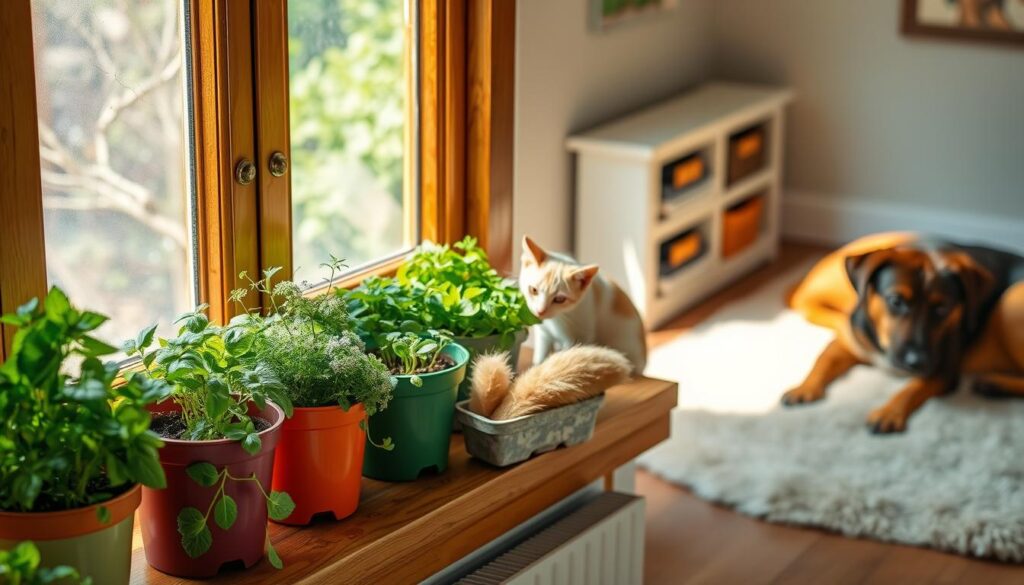
Think about the containers, soil, watering, and lighting for your indoor herb garden. This way, you can have a beautiful, safe garden for your pets.
Creative Ways to Incorporate Pet-Safe Herbs Indoors
Growing non-toxic herbs indoors is not just practical, it’s also a way to add beauty to your home. If you want to create a beautiful indoor herb garden ideas, here are some ideas. These options let you bring nature inside safely for your pets.
Consider using hanging baskets or tiered planters to show off your herbs. This keeps them out of your pets’ reach. Or, try hydroponics or terrariums for a unique look that’s easy to care for in your decorative herb gardening.
- Hang baskets of fragrant herbs like lavender or rosemary for a captivating vertical display.
- Arrange tiered planters on shelves to create a dynamic, multi-level herb garden.
- Cultivate a mini indoor oasis with a self-contained terrarium featuring pet-safe herbs.
- Explore hydroponic systems to grow herbs without soil, perfect for small spaces.
These pet-friendly herb displays are not just pretty. They can also be useful. Herbs like lavender, rosemary, and thyme can make natural air fresheners or be part of DIY pet grooming products. By getting creative, you can make a pet-safe indoor herb garden that looks great and serves a purpose in your home.
“Cultivating a pet-friendly herb garden is not only a practical way to bring nature indoors, but it can also be a truly creative and rewarding endeavor.”
Common Toxic Herbs to Avoid with Indoor Pets
Indoor gardening brings many joys, but it’s key to watch out for risks some herbs and plants pose to pets. Avoid common household herbs like cocoa, cannabis, and certain mint types. These can be toxic to cats and dogs if eaten in large amounts.
Keeping your pets safe means knowing the toxicity levels of indoor plants. Even small amounts of some herbs can upset their stomachs, cause nerve problems, or other health issues. Learn from the ASPCA’s list of harmful indoor plants to make a pet-safe garden at home.
Understanding Pet Toxicity Levels
The toxicity of toxic herbs for pets can vary a lot. Some plants might just upset their stomachs, while others could cause serious problems. Here are a few things to keep in mind:
- Cocoa: Has theobromine, which is bad for cats and dogs. It can make them vomit, have diarrhea, and even have seizures.
- Cannabis: Marijuana’s active parts can make pets feel very tired, have trouble moving, and even go into a coma.
- Certain Mints: Some mints, like pennyroyal, have parts that can be toxic to pets if they eat a lot of it.
Knowing the toxicity levels of common household herbs helps you make a pet-safe indoor garden. This way, your pets can safely enjoy the beauty of your home.
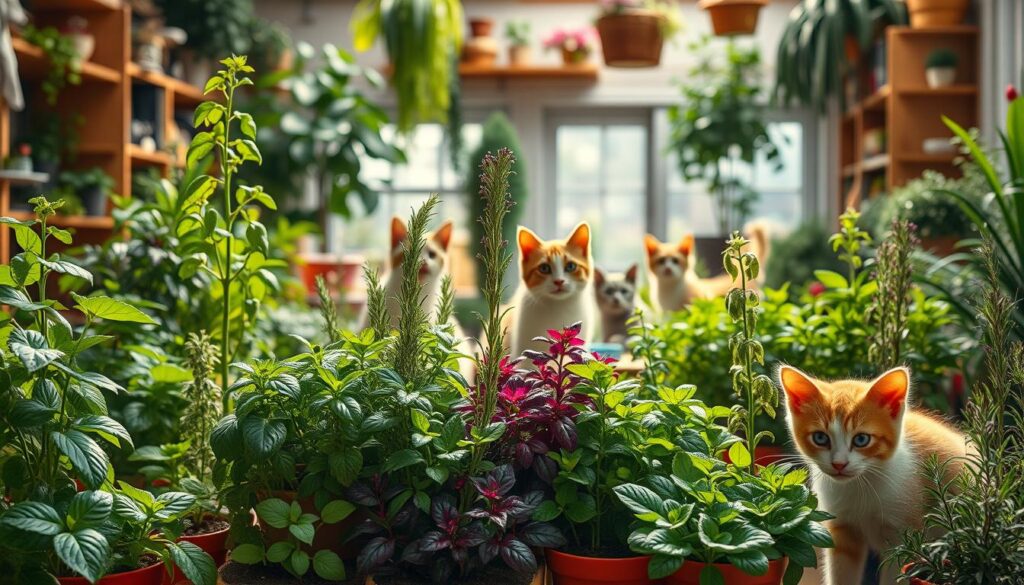
Encouraging Safe Interactions with Indoor Herb Gardens
Creating a pet-friendly herb garden indoors means thinking about your pets’ safety. Choose non-toxic herbs and make sure your pets can’t get too close. This way, they can enjoy the garden safely.
Keep your herb containers away from your pets. Use citrus scents or essential oils to keep them away. Teach your pets to “leave it” or “don’t touch” your herbs. This teaches them they’re off-limits.
- Create designated “pet-free” zones for your indoor herb garden to limit unsupervised access.
- Incorporate natural deterrents like citrus scents or essential oils to discourage your pets from interacting with the plants.
- Train your pets to respond to commands like “leave it” or “don’t touch” when near the indoor herb garden.
Being proactive with supervised pet interactions makes your home safe and peaceful. It lets your pets enjoy your pet-friendly herb garden safely. A little planning and training helps keep your pets and plants happy.
The key to a successful indoor herb garden with pets is finding the right balance between plant safety and allowing your furry friends to interact with the garden in a supervised and controlled manner.
Follow these tips to make a beautiful and pet-safe indoor herb garden. Your pets will love exploring it, and you’ll enjoy fresh herbs for cooking. It’s a win-win situation.
Conclusion
Creating a non-toxic indoor herb garden is a great way to bring nature indoors safely for your pets. Choose pet-friendly herbs like basil, parsley, and lavender for a beautiful, safe space. This space will be perfect for both you and your pets.
Use the right containers, soil, and care for a beautiful indoor herb garden. This will make your home healthier and more beautiful. By focusing on pet-safe gardening, you can enjoy growing herbs indoors without harming your pets.
Non-toxic herbs for indoor pets are a great way to connect with nature safely. Start this hobby and see your indoor herb gardens for animal lovers grow. Enjoy a peaceful, lively space with your pets.
To Read more about incorporating Herbs into your indoor gardening check out our Comprehensive Guide to Growing Herbs Indoors.
FAQ
What are some non-toxic herbs that are safe for indoor pets?
Why is it important to choose pet-friendly herbs for indoor gardening?
What are the benefits of growing non-toxic herbs indoors with pets?
How can I care for an indoor herb garden that is safe for my pets?
Are there any common household herbs that are toxic to indoor pets?
How can I encourage safe interactions between my pets and my indoor herb garden?
Source Links
- 18 Pet Friendly Indoor Plants (and 9 to Avoid at All Costs) – https://outwardhound.com/furtropolis/pets/pet-friendly-indoor-plants
- The Pet Safe Kitchen – Leaf and Paw – https://leafandpaw.com/2017/11/22/the-pet-safe-kitchen-herbs/
- 22 Pet-Friendly Plants That Will Liven Up Your Space – https://www.architecturaldigest.com/story/pet-friendly-houseplants


